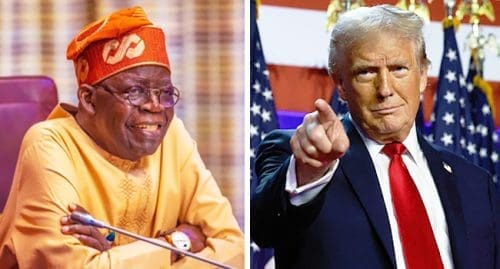Listen to the article
Nigerian President Rebuffs U.S. Claims of Christian Persecution Amid Regional Security Challenges
Nigerian President Bola Tinubu has firmly rejected allegations from the United States administration that Christians are being systematically persecuted and killed in Africa’s most populous nation. The statement comes amid ongoing security challenges in northern Nigeria that have complex historical and political roots.
The Nigerian government has characterized these allegations as unfounded and misleading, drawing parallels to what they describe as similarly baseless claims made earlier this year about supposed targeting of white South Africans. Nigerian officials suggest these accusations serve to deflect attention from domestic U.S. issues.
Nigeria, home to approximately 237 million people, has historically maintained close diplomatic ties with the United States across both Republican and Democratic administrations. As a former British colony, Nigeria holds membership in numerous international bodies including the Commonwealth of Nations, African Union, United Nations, and the Economic Community of West African States (ECOWAS).
The security challenges in northern Nigeria, which the U.S. administration has characterized as religious persecution, date back more than a decade. The Boko Haram insurgency began violently in 2009, though the group’s origins can be traced to 2002 when it formed as an Islamist movement. Since then, the insurgency has targeted military installations, police, educational institutions, and various civilian targets.
Security experts note that the conflict’s nature is more complex than religious targeting, as the majority of victims in the northeastern regions are actually Muslims. The insurgency has evolved over time, with Boko Haram splintering into different factions, including the Islamic State of West Africa Province (ISWAP), creating an atmosphere of lawlessness in parts of the northeast.
The violence has spilled beyond Nigeria’s borders into neighboring Niger, Cameroon, and Chad, prompting efforts to form regional security taskforces. These ongoing challenges have contributed to broader instability across parts of West Africa and the Sahel region.
Nigerian historians and analysts point to deeper historical factors underlying today’s conflicts. The legacy of the Atlantic Slave Trade, British colonialism, and post-colonial policies created regional and sectarian divisions that continue to shape contemporary Nigerian politics. British colonial authorities employed divide-and-rule tactics that separated Nigerian groups from one another, creating disparities in development and education between the predominantly Muslim north and the Christian south.
Following independence in 1960, Nigeria experienced a devastating civil war from 1967-1970 that claimed approximately one million lives. A series of military coups further hampered democratic development, creating conditions that have contributed to ongoing governance challenges.
Since returning to civilian rule in 1999, Nigeria has continued to face periodic regional conflicts and insurgencies across different parts of the country. The Nigerian government maintains that addressing these complex security challenges requires a nuanced understanding of historical context and regional dynamics.
Nigeria’s strategic importance stems not only from its large population but also from its abundant natural resources, including crude oil, natural gas, coal, and various minerals. The country possesses major Atlantic ports including Lagos, Tin Can Island, Calabar, and Port Harcourt, making it a crucial economic player in West Africa and the continent at large.
Nigerian officials argue that solutions to the country’s security challenges will come through regional cooperation, addressing underlying economic disparities, and strengthening democratic institutions—not through external intervention based on what they view as mischaracterizations of complex local conflicts.
As Nigeria continues to navigate these challenges, the diplomatic tensions with the United States add another layer of complexity to the country’s efforts to maintain stability and foster development across its diverse regions.




10 Comments
As a major player in West Africa, Nigeria’s perspective deserves careful consideration. The US accusations may be well-intentioned, but the Nigerian government’s rejection suggests there are nuances that warrant further exploration before drawing conclusions.
Geopolitical dynamics can be complex, and it’s important to avoid oversimplification. Nigeria’s rejection of the US claims indicates the need for a more comprehensive understanding of the situation on the ground.
This is a complex issue with a lot of historical and political context. It’s important to look at the situation objectively and avoid oversimplification or politicization. Nigeria’s rejection of the US allegations seems reasonable given the nuances involved.
Agreed, the security challenges in northern Nigeria have deep-rooted causes that require careful analysis. Dismissing the Nigerian government’s perspective as mere deflection may not be constructive.
The relationship between Nigeria and the US is an important one, with long-standing diplomatic ties. It’s concerning to see allegations of religious persecution, but Nigeria’s response highlights the need for impartial investigation and dialogue to address these issues.
Absolutely, maintaining open communication and mutual understanding between nations is crucial, especially on sensitive matters like religious freedoms and security concerns. Rushing to judgment rarely leads to productive solutions.
The Nigerian government’s rejection of the US allegations raises important questions about the nuances of the situation on the ground. Maintaining a balanced and objective approach, while respecting the sovereignty of nations, is crucial in addressing such sensitive matters.
Absolutely. Navigating these types of diplomatic tensions requires careful consideration of historical, political, and cultural contexts. Jumping to conclusions without a comprehensive understanding of the issues at hand is unlikely to lead to meaningful solutions.
This issue highlights the importance of maintaining open and honest dialogue between nations, even when there are disagreements. Rushing to judgment or making unsubstantiated claims can undermine diplomatic efforts and hinder progress on important issues.
Agreed. Constructive engagement and a willingness to understand each other’s perspectives are key to addressing complex challenges like regional security and religious freedom. Dismissing Nigeria’s response as mere deflection would be counterproductive.